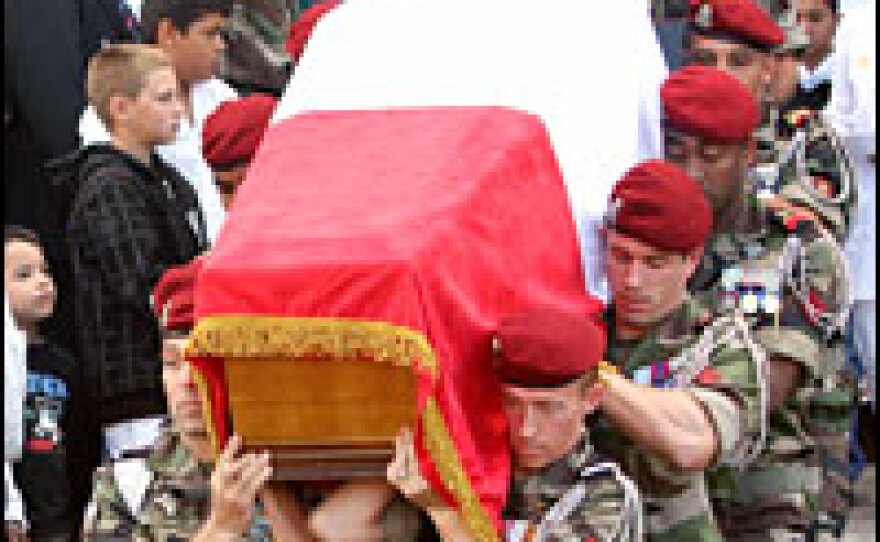
On Friday, the 28 members of NATO gather at a summit on the French-German border to celebrate the transatlantic defense alliance's 60th anniversary.
The occasion will also mark France's full return to NATO's integrated command structure, 43 years after then-President Charles de Gaulle withdrew his country in defiance of U.S. domination.
French President Nicolas Sarkozy says France's position is now alongside the U.S., but not everyone in France agrees.
De Gaulle's Appraoch
In October 1966, de Gaulle announced that France, with its nuclear capabilities, would defend itself.
"We will accept no subordinating of our forces by a foreign authority," de Gaulle said. "In one month, no military base or allied army will remain on our territory."
De Gaulle pulled his country out of NATO's top command and kicked NATO headquarters out of Paris. He wanted France to stand apart from U.S. domination of post-war Western Europe. But despite taking its distance from NATO's top decision-making body, France has never left the alliance. Today, it is the fourth-largest contributor of troops.
France participates fully in NATO's missions in Kosovo, Bosnia and Afghanistan. Sarkozy says it is now time for France to take its full place in NATO command structures.
"I don't believe the role of a great power like France is to remain on the fence," Sarkozy said. "That means we're nowhere. The most important condition for independence is to know who your friends are. And I'm not afraid to say that our place is first and foremost with our Western allies."
France's Debate Over NATO Return
The French parliament had a vociferous debate over the country's return to NATO, with critics saying it would sacrifice the country's independence on the world stage. French Parliamentarian Nicolas Dupont-Aignan says his opposition to France's return to NATO is not based on anti-Americanism.
"We were solidaire when it was necessary with the United States, but we could say no, for example, against Bush when Bush went to Iraq. With this reintegration, I'm not sure we will be able to say no like we did. I think a good ally [is] an ally that is independent," Dupont-Aignan says.
Opposition to France's reintegration of NATO command structures also came from members of Sarkozy's own party. Dominique de Villepin led French opposition to the Iraq war as foreign minister in 2003.
"Arab, African and Latin American countries have always appreciated France's freedom and originality," de Villepin says. "If we rejoin the top ranks of NATO, our room to maneuver and be a powerful voice in a multipolar world will be compromised."
Reaction Mixed
Frederic Bozo, historian at the Sorbonne and author of a book about the French exception in NATO, says that is nonsense. Bozo points out that Germany fully opposed the Iraq war from within the alliance. He says France's rejoining of NATO command structures won't change anything on the ground, but will have political and symbolic importance.
"The simple fact that France refused to have a normal position in NATO was in itself a problem because it showed the limits of Atlantic consensus," he says. "With France returning to a normal position, NATO certainly gains coherence and cohesion."
The United States has welcomed the French move and is said to be amenable to France taking over top NATO command posts in Lisbon, Portugal and Norfolk, Va. While polls show that more than half of the French people are in favor of France rejoining NATO, they don't support sending more troops to fight in Afghanistan.
The nation recently mourned the deaths of 10 French soldiers who were killed by the Taliban in Afghanistan. The soldiers' funerals were broadcast live on television.
With little public or political tolerance for the bloodshed, analysts say, France's new stature in NATO is not likely to mean more French soldiers on the ground in the organization's most important mission.
Copyright 2022 NPR. To see more, visit https://www.npr.org. 9(MDAzMjM2NDYzMDEyMzc1Njk5NjAxNzY3OQ001))






